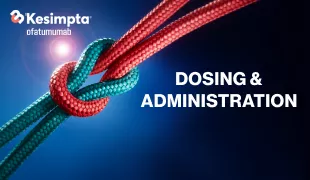KESIMPTA® Safety Information
Indications and Clinical Use:
KESIMPTA® (ofatumumab injection) is indicated for the treatment of adult patients with relapsing remitting multiple sclerosis (RRMS) with active disease defined by clinical and imaging features.
KESIMPTA® treatment should be initiated and supervised by health professionals experienced in the treatment of patients with MS and who are familiar with the efficacy and safety profile of KESIMPTA®.
KESIMPTA® is not authorized for patients <18 years of age.
KESIMPTA® has not been studied in patients ≥55 years of age.
Contraindications:
Hypersensitivity to this drug or any ingredient in the formulation
Active HBV infection
Severe, active infections
Current or history of confirmed progressive multifocal leukoencephalopathy (PML)
Severely immunocompromised state
Known active malignancies
Relevant warnings and precautions:
Injection site reactions: Local symptoms including erythema, swelling, itching and pain.
Injection-related reactions with systemic symptoms observed predominantly within 24 hours of the first injection but were also observed with later injections.
Systemic injection-related reactions: Rash, urticaria, dyspnea, angioedema, and rare cases reported as anaphylaxis.
A hypersensitivity reaction may present with any injection, although typically would not present with the first injection. Patients with known IgE mediated hypersensitivity to KESIMPTA® must not be treated with KESIMPTA®.
Potential for increased immunosuppressive effects with other immunosuppressants.
Physicians should review the immunization status of patients before starting treatment with KESIMPTA®. KESIMPTA® may interfere with effectiveness of inactivated vaccines. Vaccination with live or live-attenuated vaccines is not recommended during treatment and after discontinuation until B-cell repletion.
Infants of mothers treated with KESIMPTA® during pregnancy should not receive live or live-attenuated vaccines until the recovery of B-cell counts has been confirmed.
KESIMPTA® may increase risk of infections. Administration should be delayed in patients with an active infection until the infection is resolved. It is recommended to evaluate the patient’s immune status prior to initiating therapy.
Patients should be monitored for signs and symptoms, including MRI findings, suggestive of progressive multifocal leukoencephalopathy (PML). At the first sign or symptom suggestive of PML, withhold KESIMPTA®.
Patients with active hepatitis B should not receive KESIMPTA® treatment. Hepatitis B virus screening should be performed in all patients before initiation of KESIMPTA® treatment.
No studies have been conducted with KESIMPTA® in pregnant women or breastfeeding infants. Females of childbearing potential should use effective contraception during and 6 months after KESIMPTA® treatment.
Prior to initiating KESIMPTA®, perform testing for quantitative serum immunoglobulins. For patients with low serum immunoglobulins, consult immunology experts before initiating treatment with KESIMPTA®.
For more information:
Please consult the Product Monograph at www.novartis.com/ca-en/Kesimptamonograph for important information relating to adverse reactions, drug interactions, and dosing information which have not been discussed in this piece. The Product Monograph is also available by calling 1-800-363-8883 or by email at [email protected].
KESIMPTA, SensoReady and the Go Program are registered trademarks.
© Novartis Pharmaceuticals Canada Inc. September 2025
FA-11447944E


